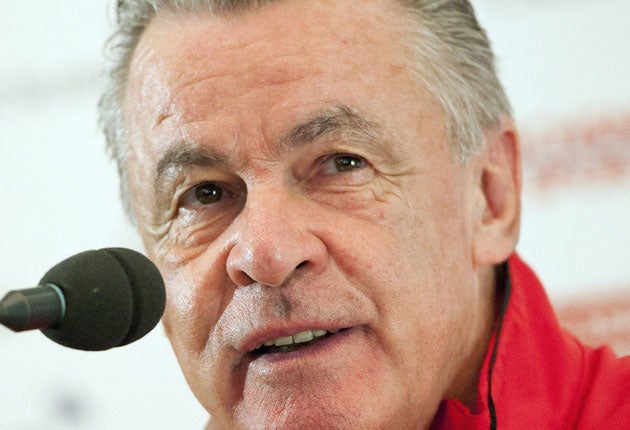Hitzfeld puts trust in cosmopolitan youth to revive struggling Swiss
Beleaguered manager looks to long-term policy to arrest their slump and restore reputation

Your support helps us to tell the story
From reproductive rights to climate change to Big Tech, The Independent is on the ground when the story is developing. Whether it's investigating the financials of Elon Musk's pro-Trump PAC or producing our latest documentary, 'The A Word', which shines a light on the American women fighting for reproductive rights, we know how important it is to parse out the facts from the messaging.
At such a critical moment in US history, we need reporters on the ground. Your donation allows us to keep sending journalists to speak to both sides of the story.
The Independent is trusted by Americans across the entire political spectrum. And unlike many other quality news outlets, we choose not to lock Americans out of our reporting and analysis with paywalls. We believe quality journalism should be available to everyone, paid for by those who can afford it.
Your support makes all the difference.Fabio Capello will today come up against one of the few coaches who can match his success at club level.
Not only can Ottmar Hitzfeld match the Italian's nine league championships, he has won two Champions Leagues to Capello's one and has five more domestic cups to boot. The German has, however, found it as difficult to adapt to the international arena as Capello.
Hitzfeld's competitive reign as Switzerland manager began with a humiliating defeat at home to Luxembourg in 2008, reached a high-water mark when Spain were beaten in last summer's World Cup, and is now waning again with the Swiss struggling to reach Euro 2012.
Which means Hitzfeld arrives at Wembley trying to juggle the pressure to remain in qualifying contention with the need to embark on a rebuilding programme. With his contract running to 2014 the 62-year-old has, unlike Capello, a vested interest in the longer term.
To an extent rebuilding has been forced on him by the recent retirements of his captain and top scorer, Alexander Frei, and another experienced striker Marco Streller. Thus he has called up two uncapped forwards for today's game, Innocent Emeghara (age 22) and Admir Mehmedi (20). They join winger Xherdan Shaqiri (19) and uncapped midfielder Granit Xhaka (18), in the squad.
"Of course we lost two key players when they retired but every change in a team can turn into an opportunity for players to prove themselves," Hitzfeld said yesterday. He added: "Xhaka can play tomorrow and I also have Shaqiri. He was at the World Cup with us in South Africa. I have no problem throwing him in either."
As well as youthful promise, what these players have in common is an immigrant background. Switzerland has become a melting pot and while this has prompted political dissent the national team is benefiting. Mehmedi, Shaqiri and Xhaka were all born in the former republic of Yugoslavia: Mehmedi is of Albanian-Macedonian descent, the others were born in what is now Kosovo. Emeghara, Nigerian born-and-bred, became a naturalised Swiss citizen only last September. "I feel like I'm at home in Switzerland," Emeghara said.
The Swiss, like several European countries, have developed a tradition of assimilating footballers of immigrant families with the Yakin brothers, Hakan and Murat, born in Basle to Turkish parents, leading the way for the current generation.
Most play for Switzerland by choice, as they would have a strong chance of being selected by their parental nation. Udinese's Gokhan Inler, another player of Turkish background, has said: "The decision to play for the Swiss national team was very important for me. I chose to play for Switzerland out of gratitude. I have received a lot from this country and I wish to be able to give something back."
Not everyone in his position opts for Switzerland. Swiss-born Roberto Di Matteo preferred his parents' Italy, but many do. Arsenal's Johan Djourou (born in the Ivory Coast), Eren Derdiyok (born in Switzerland to Kurdish-Turk parents) and ex-Manchester City midfielder Gelson Fernandes (born in the Cape Verde Islands) are also likely to start though former West Ham man Valon Behrami (Kosovar-Albanian by birth and parentage) is in contention for the latter's place. There is even an Englishman, Young Boys' Enfield-born Scott Sutter, capped twice in the autumn.
Switzerland have a miserable overall record. They have not reached the last eight of a major tournament since hosting the World Cup in 1954 and have often failed to qualify. But the new wave of immigrants offer hope, with the Under-17s, in which first-generation Swiss featured prominently, winning the U-17 World Cup in 2009. Xhaka and Ben Khalifa are the first graduates from that team to make the senior side. Others will follow, though probably not in time to restore Hitzfeld's reputation.
Join our commenting forum
Join thought-provoking conversations, follow other Independent readers and see their replies
Comments